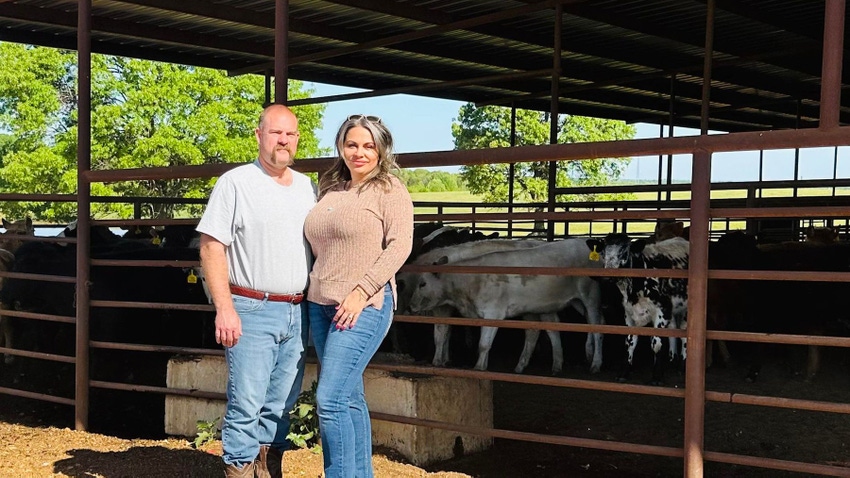
As a young teen, Clint Langley got his first taste of ownership when he was gifted his dad’s income tax refund check and purchased a dozen heifers. That was in 1994. Today, he owns thousands of head near Hugo, Okla., and buys cattle for producers from the Texas Panhandle up into Kansas.
“I stumbled upon the order-buying business on accident,” Langley says. "I had zero interest.”
But his dad’s gift and a mentor who saw in him unrealized potential gave him the firm footing he’d need to build what’s become known today as Langley Cattle Buying.
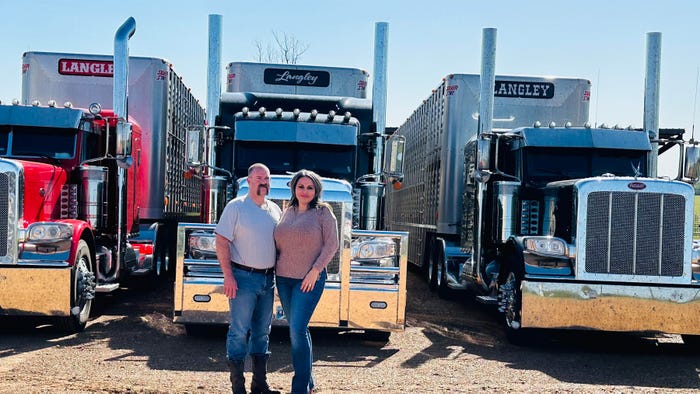
Clint and Bekah Langley. Clint said he never knew he had the ability to be a good cattle buyer but through Butch Hufnagel's encouragement and guidance, he realized he did. (Photo by Cason Langley)
“When I was 14 years old, my dad (Dwight Langley), a working-class man, gave me his tax refund check -- $4,500. He’s a truck driver. He’s been one my whole life. I took that check and bought me 12 heifers and that’s what started my cattle ownership,” he says.
By the time Langley graduated high school, he had turned that original investment into 40 mama cows, “that were free and clear. I didn't owe any money on them, and I was able to borrow money against them and buy more.”
He added yearlings to the herd, all while working a town job installing septic systems and water lines. “The job was not paying squat,” he said. He decided he could quit his job, run a few more cattle and still come out with the same income.
Slowly, Langley began attending weekly cattle auctions, purchasing for himself and occasionally others. “A neighbor would say, ‘Well, since you’re sitting here, how about you buy me a few calves?’ or ‘Since you go to these auctions, how about you buy me a few?’”
As favors evolved into commissions and his customer base grew, so did his belief that he might have found his niche. But it was the encouragement and guidance of a neighbor and local cattle producer, the late Butch Hufnagel, that solidified his calling.
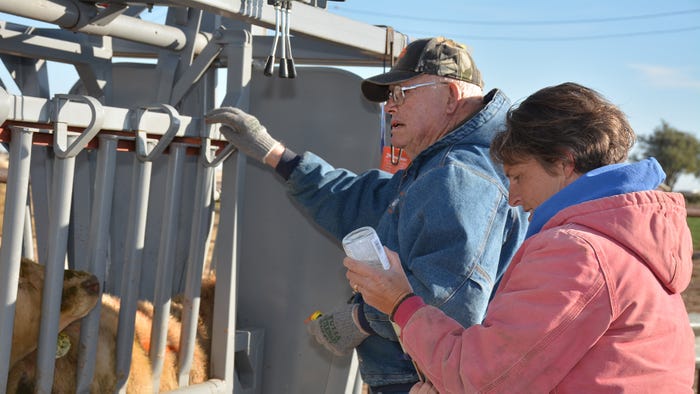
The late Butch Hufnagel, Paris, Texas, doctors cattle with his daughter Diane Heitschmidt, Nazareth, Texas. Clint Langley credits Butch for seeing in him what he couldn't even see in himself. (Photo by Shelley E. Huguley)
“I was there buying calves because I didn’t trust anybody else to do it and I didn’t really want anyone else to do it. I had no idea I was good at it. But Butch saw something in me that I didn’t even notice, and he trusted me.”
Hufnagel bought cattle weekly and saw Langley at the sales. Not only were he and Langley “from the same parts,” but Langley’s dad and grandfather had hauled cattle for Hufnagel for years.
“Butch bought a good number of cattle, and he gave me a chance when nobody else did,” Langley said. “I didn’t know I had the ability and he led me in that direction.”
Cattle buying principles
Hufnagel passed away January 17, 2023, but his impact on Langley’s life remains. From helping him build his ranch operation to introducing him to others in the industry, his legacy lives.
“I run my operation just the way he would,” Langley said. “We think about things similarly. He taught me a lot about cattle that I had no clue about.”
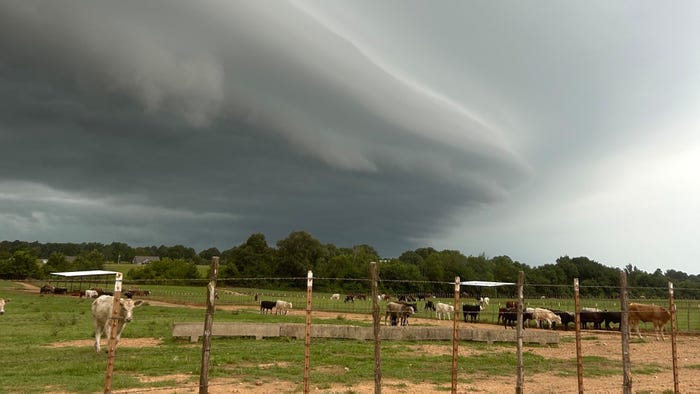
Clint Langley's cattle graze beneath a stormy sky. (Photo by Clint Langley)
He credits Hufnagel for teaching him about hedging. “He told me a long time ago, when I first got started, that you buy cattle every week and you sell every week and that is your hedge. Don’t mess with those people in Chicago.
“The market can go up and the market can go down as you’re buying and selling in the same market. The market can do whatever it’s going to do. But when everybody else doesn’t want to buy cattle or they’re scared for whatever reason, that’s when you need to lay the hammer down.
“It may not pay you today, but down the road it will. And it has happened to me time and time again.”
High-risk cattle
Langley buys only high-risk cattle, calves right off the cows. “That’s my niche -- one at a time in auctions in Louisiana, Arkansas, Oklahoma and Texas.”
In the late summer, early fall, during their peak season, he and his buyers make about 30 auctions a week. “On a slow week, we’ll buy about 1,250 head. On an average week, we’ll buy 1,800 to 2,000.”
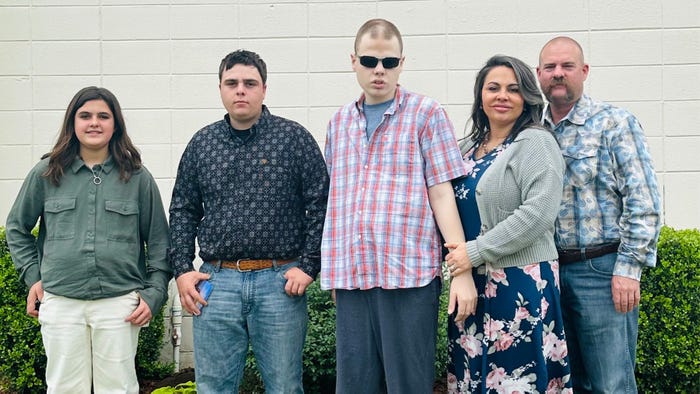
Clint Langley family, from left, Cori, Cason, Colton, Bekah and Clint (Photo by Clint Langley)
Langley, like many, is feeling the pinch of increased production costs. “Cattle are costing about two to three times their normal amount,” he said.
“Interest rates are killing me. My interest rate is three times what it was two years ago. We’re paying 9% interest on money, where we were paying 3% and 5% interest. Your labor and fuel is higher.
“The amount of money it takes to operate, kills me as well,” he says. “Where one load of cattle used to cost $50,000 to $75,000, now it can be as high as $175,000.”
The value of relationships
Langley’s family, his wife Bekah, and their three children Colton, Cason and Cori, play an instrumental role in Langley Cattle Buying.
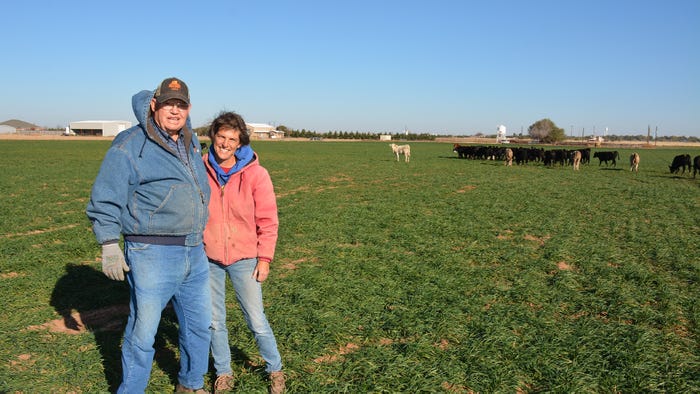
Clint Langley admired how Butch Hufnagel valued family. Here he's pictured with his daughter Diane Heitschmidt in a 2017 photo. (Photo by Shelley E. Huguley)
Hufnagel modeled his beliefs, that family and relationships are key to building a successful business. Langley credits him for introducing him to other cattle producers and buyers which led him to meeting other buyers. “It was a domino effect,” he said. “But it all started with Butch.”
He also noted Hufnagel’s character and priorities. “I was raised to be honest and honorable, but I did see an example of that through him. I saw his dedication to work and to his family. Family was important to Butch.”
If it wasn’t for Butch Hufnagel, Langley assured, “I wouldn’t be where I am today.”
About the Author(s)
You May Also Like






